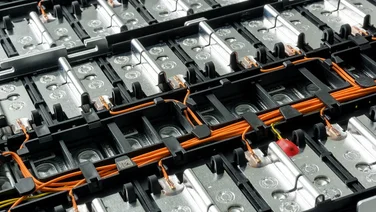We receive a small fee from trusted installers when you request a quote through our site. This helps us keep our content independent, well-researched and up to date – Learn more
- Electric vehicles are much better for the climate than traditional cars
- They release zero tailpipe emissions
- But they still generate emissions at different stages of their life

When you’re forking out thousands of pounds on an electric cars, and possibly paying the price for an electric home charger, you want to make sure you’re getting what’s promised – a greener lifestyle.
But are EVs as eco-friendly as we think? And just how much better are they for the environment compared to fossil fuel-powered cars? We’ll answer all the questions racing through your mind in this handy article.
To find your perfect EV charging point, check out our easy-to-use comparison tool. Simply provide a few details about your home, and we’ll pass them on to our expert installers, who’ll give you their best prices.
Get free EV charging point quotes
Answer a few quick questions, and our trusted installers will send you bespoke EV charging point quotes – for free.

Are electric cars better for the environment?
Let’s get one thing straight: electric cars are definitely better for the environment than petrol and diesel cars. The further we can move away from fossil fuels, the better.
That’s not to say that electric cars are totally good for the environment, however. Although they’re one of the best options for us right now, electric vehicles still generate emissions at different stages of their life – and there’s a long way to go before they become 100% green.
But how exactly can they be bad for the environment?
Environmental impact of electric vehicles
The good news is, since electric cars have no tailpipe, EV owners don’t release any CO2 emissions whilst driving. This means the more electric vehicles we have on the road, the better quality our air will be.
Electric cars are also much quieter than conventional vehicles, which can help reduce noise pollution – especially in cities.
It might be looking pretty positive for electric cars that are on the road, but what about off the road? Well, that’s a different story…
Production
The main environmental impact of electric cars occurs before an electric car has even left the factory floor.
The CO2 emissions generated from electric car production are 59% higher than the level in the production of traditional internal combustion engine vehicles. The key reason behind this is largely down to the battery manufacturing process.
The level of emissions also comes down to where the electric car is being made. Most car batteries are made in China, South Korea, and Japan, where the use of carbon in electricity production is relatively high.
An EEA report found that in China, 35-50% of total EV manufacturing emissions arise from electricity consumption for battery production – up to three times higher than in the United States. If electricity was generated by wind power alone, however, China would see a 50% drop in emissions from the production phase.
Materials for the battery
Electric cars run off lithium batteries, which are made up of base metals such as copper, aluminium, and iron – all of which require energy-intensive extraction. This carbon-heavy process is the reason some argue that electric cars aren’t as green as they seem.
You can find the full list of metals and minerals that are in EV batteries on our page.
Cobalt, a key metal used in EV batteries is particularly controversial because of its negative humanitarian impact. You can read more about cobalt and it’s alternatives by going to our page.
In Germany, the Institute for Economic Research has even suggested that electric vehicles will barely help cut CO2 emissions in the country over the coming years. According to the Institute, “the CO2 emissions of battery-electric vehicles are, in the best case, slightly higher than those of a diesel engine.”
Other recent studies of electric cars in Germany, however, have reached the opposite conclusion. One study found that emissions are up to 43% lower in EVs than diesel vehicles.
What’s more, there is currently no standardised process for recycling batteries, which means there is an ever-growing pile of electronic waste building up in landfills.
Type of energy the car consumes
Governments across the globe are pushing for cleaner energy in order to meet climate targets set by the Paris Agreement. This is great news for EV owners, and means electric cars have the potential to be 100% green once they’ve left the factory.
As it stands, most electric vehicles will still be generating emissions by consuming electricity from the UK grid.
That said, with the growing rate of renewable energy in the UK grid mix, it’s possible that electric cars will run off 100% renewable energy in the near future (and may even give energy back, with vehicle-to-grid chargers.)
In the UK, emissions from electricity generation have fallen by 8% in the past three years alone, and are expected to fall by more than 70% by the mid-to-late 2020s. We’ve outlined the difference in electricity generation in the UK since 1990:
Data from UK National Grid
To give you an idea of how much the UK government has been pushing for cleaner energy in recent years, check out the charts below.
Data from the UK government

Electric car carbon footprint
It’s difficult to give an exact figure for an electric car’s carbon footprint as it depends on the type of car, as well as the country it was produced in.
The chart below shows an estimate of lifecycle emissions for a typical European conventional (i.e. internal combustion engine) car and a Nissan Leaf electric vehicle for various countries, as well as the EU average.
The chart includes tailpipe emissions and emissions from the fuel cycle, which includes oil production, transport, refining, and electricity generation. You’ll also find emissions from manufacturing the non-battery components of the vehicle, and a conservative estimate of emissions from manufacturing the battery.
Data from Carbon Brief
How long do you need to own an electric car before it’s fully green?
Most EV owners need to drive about 13,500 miles (21,725 km) before their electric vehicle becomes fully green, according to Reuters.
But this depends on multiple factors, including the size of the EV’s battery, the fuel economy of a gasoline car, and how the power used to charge an EV is generated.
For instance, the example above is based on a Tesla 3 driving in the United States (where 23% of electricity comes from coal-fired plants) among other variables. But if the same Tesla was driven in Norway, which generates almost all its electricity from renewable hydropower, the car would become fully green after just 8,400 miles.
If an EV owner also has a set of solar panels at home, they can reduce the amount of time it takes to make it fully green even further, as they can use them to charge their vehicle.
Want to learn more? Check out our A Guide To Solar Panel EV Charging Points.
Despite being greener than both petrol and diesel vehicles, only 55% of people would have an EV if it were free, according to our National Home Energy Survey.
So, are electric cars the future?
Electric cars are growing in popularity, and seem to be going from strength to strength – the National Grid predicts there will be 36 million electric vehicles on UK roads by 2040. Everything points to battery-electric cars being the future of mass transportation.
Although electric cars are more popular in most countries, hydrogen might have a stronger future in Japan – but only through large-scale investment from the government.
Currently, the production of electric vehicles is the main environmental concern. However, EVs are responsible for considerably lower emissions over their lifetime than vehicles that are run on fossil fuels, regardless of the electricity source.
As the world pushes for more renewable energy, electric cars will in turn become even more environmentally friendly. In fact, reducing worldwide carbon intensity by 30% would see a 17% reduction in greenhouse gas emissions from battery production by 2030.
What’s the verdict?
Clearly, there are a few things that need to be improved in the manufacturing process of electric cars. But since transport accounts for over 24% of global CO2 emissions, using EVs is certainly a step in the right direction.
For the time being, consumers will have to choose between a fossil fuel car that is continually pumping out emissions, or an electric car that, if running on renewable energy, stops emitting CO2 once it leaves the factory. We know which one we’d choose.
The only looming question left is whether we have enough time to fix the damage that fossil fuel cars have done.








